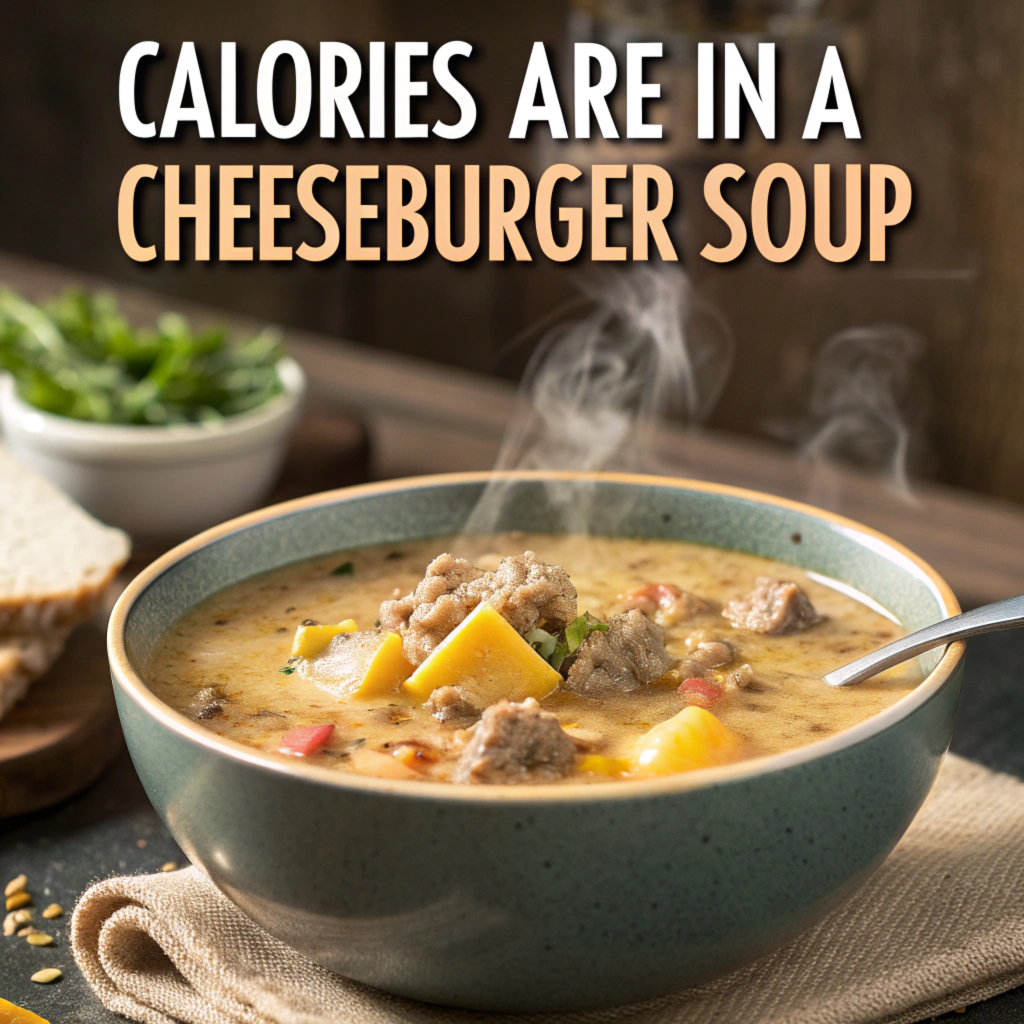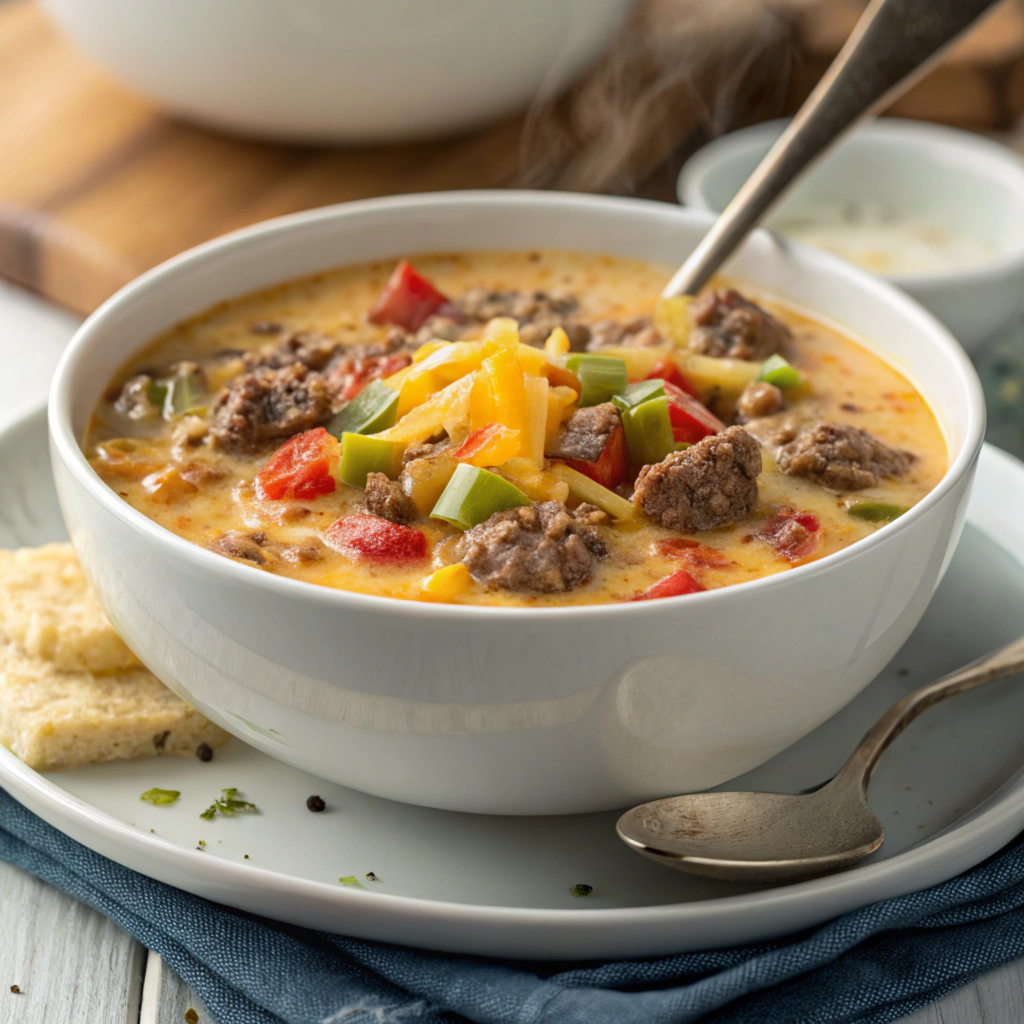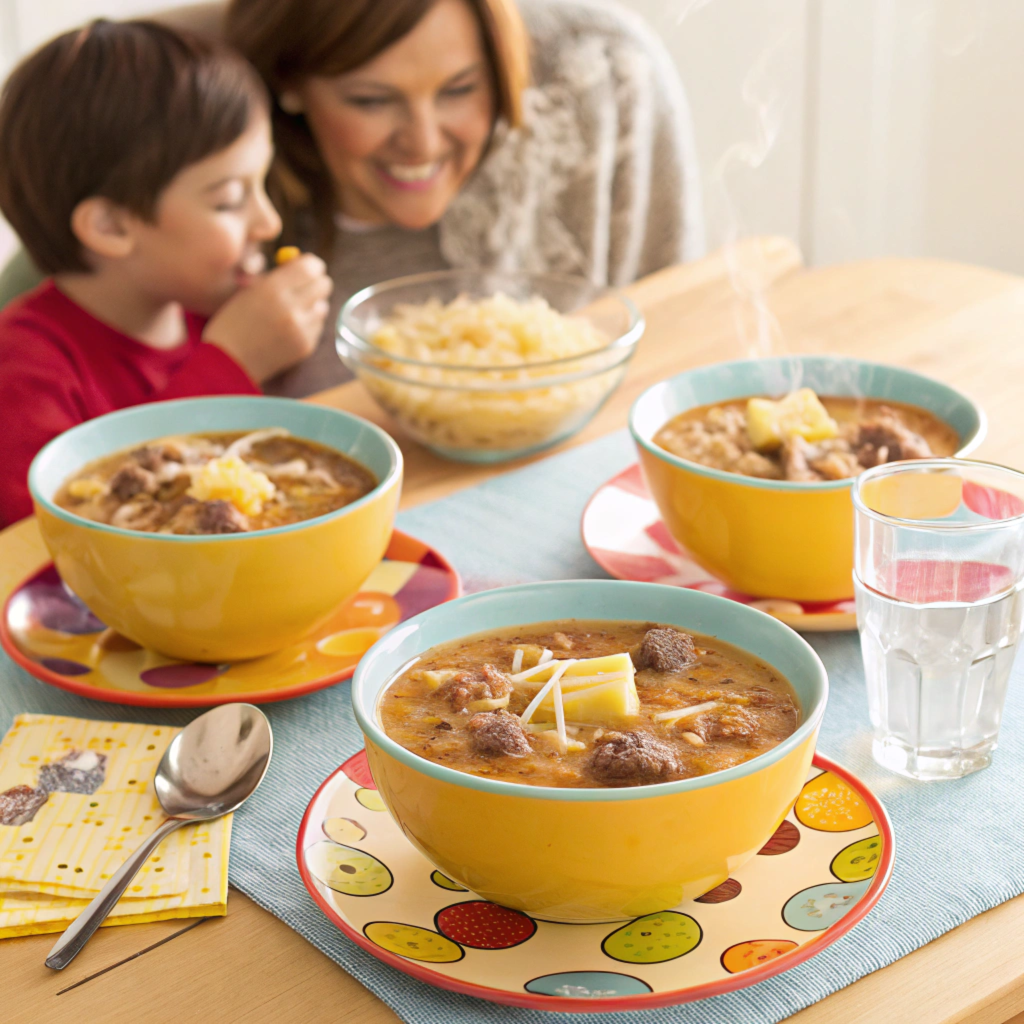
Cheeseburger soup is a rich and satisfying dish made with ground beef, cheddar cheese, creamy broth, and hearty vegetables. It delivers a comforting, indulgent taste similar to a classic cheeseburger but in a warm, spoonable form. While its flavor profile makes it a popular comfort food, understanding its calorie content is crucial if you are watching your diet. This guide explores the calorie breakdown of cheeseburger soup, ways to reduce calories, and tips for making healthier versions at home.
Why Knowing the Calorie Content Matters
Monitoring calorie intake is essential for maintaining a balanced diet. Cheeseburger soup can be calorie-dense due to its combination of fatty ingredients such as ground beef, cheddar cheese, and heavy cream. Knowing how many calories are in your serving allows you to adjust portion sizes or modify the recipe to fit your nutritional needs.
Calorie awareness also helps maintain energy balance. Consuming more calories than your body needs can lead to weight gain, while a calorie deficit can promote weight loss. If cheeseburger soup is a frequent part of your meal plan, understanding its calorie count can help prevent overindulgence while allowing you to enjoy this tasty comfort food.
Understanding Cheeseburger Soup’s Nutritional Value
The nutritional content of cheeseburger soup depends on its ingredients and preparation methods. Classic recipes typically include high-calorie components like full-fat cheese, ground beef, potatoes, and cream-based broth. These ingredients are nutrient-rich but also energy-dense, meaning they provide a lot of calories in a small portion.
Key Nutrients in Cheeseburger Soup:
- Protein: Ground beef and cheese provide protein essential for muscle repair and energy.
- Calcium: Dairy ingredients like cheddar cheese and cream contribute calcium for strong bones.
- Fiber: Vegetables such as potatoes, carrots, and celery add fiber, supporting healthy digestion.
- Vitamins and Minerals: Ingredients like onions and carrots provide vitamins A, C, and K, along with potassium and folate.
A Comfort Food Favorite with Customizable Calories
One of the best features of cheeseburger soup is its flexibility. You can adjust its ingredients to fit specific dietary preferences and calorie goals. Customizing your recipe allows you to enjoy its comforting flavors without exceeding your daily caloric intake.
Ways to Customize Cheeseburger Soup:
- For a Low-Calorie Version: Use lean ground turkey, low-fat cheese, and broth instead of cream. Add more vegetables like spinach and zucchini to boost volume without extra calories.
- For a Keto-Friendly Version: Skip high-carb ingredients like potatoes and carrots, using heavy cream and cheddar cheese for a high-fat, low-carb soup.
- For a Vegetarian Version: Use plant-based crumbles and vegetable broth while loading up on hearty vegetables like mushrooms, squash, and bell peppers.
Managing Portion Sizes for Calorie Control
Even when making a healthier version, portion control is key to managing calorie intake. Stick to a standard serving size of 1 cup, which typically contains 300 to 500 calories depending on the recipe. Use measuring cups to serve exact portions and avoid overfilling your bowl.
Calorie Breakdown by Ingredient
The calorie content of cheeseburger soup depends on its individual ingredients. Each component contributes to the overall nutritional value, including calories, protein, fat, and carbohydrates. Understanding the calorie breakdown helps you adjust the recipe for your dietary needs, whether you want a lower-calorie version or a more indulgent meal. Let’s explore how key ingredients impact the calorie count in a typical serving of cheeseburger soup.
Protein Sources
1. Ground Beef (80% Lean): ~290 Calories per 4 oz
- Ground beef is the main protein source in cheeseburger soup, adding rich, meaty flavor. However, its fat content significantly contributes to the calorie count.
- Tip: Use 90% lean ground beef for about 200 calories per 4 oz or swap it with ground turkey or chicken for a lighter option at only 150-170 calories per serving.
2. Plant-Based Meat Alternatives:
- Plant-based crumbles like soy-based or pea protein products offer about 120-150 calories per serving, making them a lower-fat, protein-rich substitute.
Dairy and Cheese
1. Cheddar Cheese: ~110 Calories per 1 oz
- Sharp cheddar is a classic ingredient, giving the soup its signature cheesy flavor. A single cup of shredded cheddar (about 4 oz) adds 440 calories.
- Tip: Use low-fat cheddar or a cheese blend with reduced fat for a similar taste but fewer calories.
2. Heavy Cream: ~100 Calories per 2 tbsp
- Heavy cream creates a rich, velvety texture but is highly caloric. A cup adds nearly 800 calories to the recipe.
- Tip: Swap heavy cream with half-and-half (40 calories per 2 tbsp) or unsweetened almond milk (30 calories per cup) to lighten the soup without sacrificing creaminess.
3. Cream Cheese:
- Many recipes use cream cheese to thicken the soup. Each 2 oz portion adds about 200 calories. Use low-fat cream cheese for a similar result at only 140 calories.
Vegetables
1. Potatoes: ~110 Calories per 1 Cup (Diced)
- Potatoes add bulk and heartiness while providing fiber and carbohydrates. However, they can increase the overall calorie count due to their starchy content.
- Tip: Use cauliflower or turnips as a low-carb alternative with only 25-30 calories per cup.
2. Carrots, Onions, and Celery: ~50 Calories Combined
- These vegetables enhance the soup’s flavor while contributing essential vitamins and minerals. Their calorie content is relatively low, making them a guilt-free addition.
3. Spinach, Zucchini, and Broccoli:
- Leafy greens like spinach and hearty vegetables like zucchini and broccoli add minimal calories while boosting fiber, vitamins, and antioxidants.

Broth and Liquids
1. Chicken or Beef Broth: ~15 Calories per Cup
- Broth provides a flavorful base with almost no calories, making it a key ingredient for reducing overall fat content.
- Tip: Use low-sodium broth to manage salt intake while keeping the soup flavorful.
2. Water or Vegetable Broth:
- Adding water or vegetable broth further dilutes calories without sacrificing hydration. Each cup contains only 10-15 calories.
High-Calorie Additions to Watch Out For
- Bacon Crumbles: 80 calories per 2 tbsp
- Sour Cream: 60 calories per 2 tbsp
- Croutons: 70-100 calories per serving (about 1/2 cup)
How Many Calories Are in a Typical Serving of Cheeseburger Soup?
The calorie count of cheeseburger soup can vary widely depending on portion size, ingredients used, and preparation methods. A standard serving of cheeseburger soup is usually one cup (about 8 oz), but the total caloric content depends on the recipe’s fat, protein, and carbohydrate sources. Let’s break down the average calorie count for different versions of cheeseburger soup, including standard recipes, lighter alternatives, and restaurant-style options.
Standard Recipe (1 Cup Serving)
A traditional cheeseburger soup made with ground beef, cheddar cheese, heavy cream, and potatoes typically contains 400-500 calories per cup. This version includes full-fat ingredients, making it rich, creamy, and filling.
Calorie Breakdown (Estimated):
- Ground Beef (80% Lean – 4 oz): ~290 calories
- Cheddar Cheese (1 Cup): ~440 calories
- Potatoes (1 Cup Diced): ~110 calories
- Heavy Cream (1 Cup): ~800 calories
- Vegetables (Carrots, Onions, Celery – Combined): ~50 calories
- Chicken Broth (2 Cups): ~30 calories
Estimated Total: 400-500 Calories per Cup
Why It’s High-Calorie:
- Full-fat dairy and beef add significant calories.
- Starchy ingredients like potatoes increase carbs and calories.
Lightened-Up Recipe (1 Cup Serving)
For a healthier version, you can cut the calorie count to 250-350 calories per cup by making smart substitutions such as lean ground turkey, low-fat cheese, and unsweetened almond milk.
Calorie Breakdown (Estimated):
- Lean Ground Turkey (4 oz): ~170 calories
- Low-Fat Cheddar Cheese (1 Cup): ~240 calories
- Cauliflower (1 Cup – Substitute for Potatoes): ~30 calories
- Unsweetened Almond Milk (1 Cup): ~30 calories
- Vegetables (Carrots, Onions, Celery – Combined): ~50 calories
- Low-Sodium Chicken Broth (2 Cups): ~30 calories
Estimated Total: 250-350 Calories per Cup
Why It’s Lower-Calorie:
- Using lean meat, low-fat cheese, and plant-based milk cuts fat and calories.
- Replacing starchy potatoes with cauliflower reduces carbohydrates.
Restaurant-Style Cheeseburger Soup (1 Cup Serving)
Restaurant versions tend to be larger in portion size and higher in calories due to added fats, toppings, and sides like garlic bread or fries. Expect 600-800 calories per serving, depending on the restaurant’s preparation style.
What Adds Extra Calories:
- Bacon Crumbles: Often added as a topping, contributing 80-100 calories.
- Sour Cream and Extra Cheese: Each adds 60-100 calories per serving.
- Thickened Base: Many restaurants use flour-based roux or cream, increasing calories.
How to Avoid Overindulgence:
- Ask for a half-portion or split a serving with someone.
- Request toppings like cheese and bacon on the side.
Homemade vs. Pre-Packaged Soups
- Homemade Cheeseburger Soup: You control ingredients, portion size, and calorie count, making it the healthiest option.
- Pre-Packaged or Canned Soups: Often contain preservatives, high sodium, and added sugars. Always check nutrition labels for accurate calorie counts.
Key Takeaways:
- Stick to a 1-cup serving size for calorie control.
- Customize the recipe by swapping high-fat ingredients with lighter alternatives.
- Skip extra toppings or serve them separately to reduce overall calories.
Ways to Reduce Calories in Cheeseburger Soup
Cheeseburger soup is a delicious, comforting dish, but its traditional recipe can be high in calories due to rich ingredients like ground beef, cheese, and heavy cream. Fortunately, with some smart adjustments, you can make a lighter version without sacrificing flavor. Here are the best ways to reduce calories in cheeseburger soup while keeping it satisfying and nutritious.Calories in Cheeseburger Soup
1. Use Lean Protein
Switching to leaner protein sources can significantly cut down on calories while maintaining the soup’s hearty texture.
Healthy Protein Substitutes:
- Ground Turkey or Chicken: Replace ground beef with lean ground turkey (93% lean) or ground chicken. Each 4 oz serving has approximately 170 calories compared to 290 calories in ground beef (80% lean).
- Plant-Based Meat Alternatives: Use plant-based meat crumbles, which typically contain fewer calories and are rich in fiber and protein. Look for brands with 120-150 calories per serving.
Why It Works:
Lean proteins provide essential nutrients like protein, iron, and zinc while cutting down on fat content.
2. Choose Low-Fat Dairy Options
Full-fat dairy is one of the biggest calorie contributors in cheeseburger soup. Choosing reduced-fat versions can trim hundreds of calories per serving.

Dairy Swaps:
- Low-Fat Cheddar Cheese: Use reduced-fat cheddar cheese, which contains about 80 calories per ounce instead of the usual 110 calories.
- Skim Milk or Almond Milk: Replace heavy cream (100 calories per 2 tbsp) with skim milk (40 calories per cup) or unsweetened almond milk (30 calories per cup).
- Greek Yogurt: Substitute Greek yogurt for sour cream or cream cheese. Greek yogurt provides creaminess with added protein at just 60 calories per 1/2 cup.
Why It Works:
Swapping high-fat dairy ingredients with lighter alternatives maintains the soup’s creamy texture while reducing fat and calories.
3. Add More Vegetables
Vegetables are nutrient-dense, filling, and naturally low in calories. Adding extra veggies increases the soup’s volume while keeping it light.
Best Vegetables to Add:
- Carrots, Onions, and Celery: These classic soup base vegetables add vitamins and only 50 calories combined per cup.
- Spinach or Kale: Leafy greens wilt easily into the soup while providing fiber and essential nutrients at just 10-15 calories per cup.
- Zucchini or Cauliflower: Use diced zucchini or cauliflower instead of starchy potatoes. Each cup contains only 25-30 calories.
Why It Works:
Vegetables increase fiber and vitamins while lowering overall calorie density.
4. Skip High-Calorie Toppings
Popular cheeseburger-inspired toppings like bacon, extra cheese, and croutons can quickly raise the soup’s calorie count.
Healthier Topping Alternatives:
- Herbs and Spices: Use fresh herbs like parsley, chives, or green onions for extra flavor without added calories.
- Light Cheese Sprinkle: Add just 1 tbsp of shredded low-fat cheese for extra flavor with minimal calories.
- Plain Greek Yogurt: Use a small dollop of Greek yogurt instead of sour cream for added creaminess at half the calories.
Why It Works:
Reducing or skipping high-calorie toppings keeps the soup flavorful while cutting unnecessary fat and carbs.
5. Use a Broth-Based Base Instead of Cream
Switching from a heavy cream base to a broth-based soup significantly lowers calories without sacrificing flavor.
Recommended Broths:
- Low-Sodium Chicken or Beef Broth: Contains only 15 calories per cup while adding savory depth.
- Vegetable Broth: A great low-calorie, plant-based alternative with about 10 calories per cup.
Why It Works:
Broth-based soups have fewer calories, making them more weight-loss friendly while still feeling hearty.
6. Watch Your Portion Sizes
Even healthier versions can be high in calories if you eat oversized portions. Stick to 1-cup servings to manage your calorie intake. Use measuring cups when serving and avoid going back for seconds.
By making these simple swaps and adjustments, you can enjoy a lighter, healthier version of cheeseburger soup while keeping its signature creamy, savory flavor intact. Would you like me to continue with the next section on Factors That Affect Caloric Content?